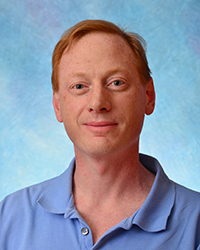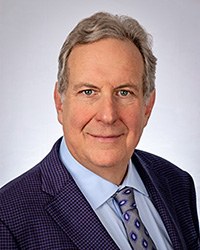This is the first episode of Chair’s Corner. It features an interview with Dr. Ron Falk and Dr. Joseph (Alex) Duncan, in a discussion on the new UNC Physician Scientist Training Program.
Listen to the full length recording (14 min)
-Joseph (Alex) Duncan, MD, PhD


Full Transcript
Falk: Hello, this is Ron Falk for the Department of Medicine at the University of North Carolina. Welcome to the Chair’s Corner. This is the first episode of what will be a series of Chair’s Corner podcasts, and we’ll have a chance to discuss and highlight people, programs, and important things happening in our wonderful department.
Today I will be talking with Dr. Alex Duncan. He holds a number of positions here at UNC—not only is he an Associate Professor in the Division of Infectious Diseases, he is also the Fellowship Director for that program.
What he is here for today is to help us understand the Department of Medicine Physician Scientist Training Program. This is a relatively new program here. Welcome, Alex Duncan.
Duncan: Thank you Ron, for having me.
Falk: The Physician Scientist Training Program has been rebranded at UNC. In fact, we are in the process of recruiting candidates even as we speak today. For those who are listening, can you tell us about this program? What is it? What does it mean to have a Physician Scientist Training Program?
Duncan: The program that we are trying to establish is sort of a formalization of residency training that allows us to utilize the American Board of Internal Medicine Research Training Pathway but also to put some Departmental “oomph” behind that training in order to help boost the careers of developing physician scientists.
Falk: Why is there a need to have a Physician Scientist Training Program in the first place? Aren’t there plenty of physician scientists?
Duncan: Well, there’s not a lot of physician scientists, and you have to keep the pipe line open, because people who go into this career are also retiring, and if we don’t continue to replenish that, then we probably run the risk of having too few physician scientists. Those physician scientists are people who can really use the medical knowledge- they’re physicians, but also have an understanding of really modern scientific methodologies and techniques. They’re going to be the folks that can identify the needs in terms of addressing human disease, and also then apply the science.
Falk: So, there really then is the need to develop a pipe line of these really bright young investigators to replenish the gradual vanishing of the pool of older physician scientists.
Duncan: Yes, and really opening that pipeline is the key. A lot of folks who go into medical school have an interest in medicine and science, but they tend to veer off course because the easy path for many of them is the one that’s most established, that most people going into medical school follow is to just go down the clinical path and become really good physicians. Unless you sort of divert them or keep them from following that standard path, they’ll tend to just fall down that track, even if they have a great interest in science, and sometimes even if they’ve been trained in their early career as medical scientists through programs like UNC’s Medical Scientist training program. Programs exist like that all over the country, where developing physicians get both MD’s and PhD’s during their training.
Falk: What made you become both a physician and a wonderful scientist? What was that magic moment for you?
Duncan: That’s a tough one. I was always a scientist in my heart of hearts. I was always interested in science from a very young age. I went to the California Institute of Technology, which is a very science-oriented undergraduate program with very few physicians. My grandfather was a physician and I had always looked up to him as a youth. At some point as I was thinking about what I wanted to do with science, I decided that I really wanted to apply it to human health. I became interested in MD/PhD programs and that’s how I sort of started down this track.
Falk: What’s the role then of finding a mentor and helping you move along in one’s career in this regard?
Duncan: Scientific training really requires a couple of prolonged periods of intense investigations for one to develop their skills.
Falk: Prolonged adolescence, is that what you’re describing?
Duncan: Yeah, maybe! There’s a lot of trial and error in learning how to apply science and how to do it correctly. It’s typically done through acquiring a PhD or working in somebody’s lab for a long period of time, long period being several years, where you get a chance to take on a scientific project, develop hypotheses, figure out how to do experiments, see when those experiments don’t work, how to revise what you’re doing. Typically after that, you have some idea of what you’re doing, but then you’ve only really worked on what your first mentor’s worked on.Most folks who are going to become successful scientists will then go on and have a postdoctoral research experience, often times after finishing their PhD, sometimes after finishing an MD, where they work again closely with another scientist. But this time, they have some of those skills already in hand, and now they’re ready to begin to develop their own scientific ideas and hypotheses for what they actually want to study and have a passion for to sustain their career in research.
Falk: It doesn’t just have to be a “wet-lab” if you can use that word– scientist, it can be somebody who is interested in epidemiology or computational biology, the same sorts of training would be required.
Duncan: Sure, and UNC has great examples of scientists who work in very clinically-oriented areas, in genomics and bioinformatics…we have a tremendous School of Public Health with some of the greatest epidemiologists in the country here. All of them are doing science and all of those fields require significant training beyond what you would get in medical school.
Falk: What makes this program that you now run different from all the other Physician Scientist Training Programs that exist across the country?
Duncan: Again, many physician scientists, especially if they’ve come through an MD/PhD program or have a significant research experience during their medical school, such as going off to do a Master’s in Public Health or other types of research experiences, when they go into residency, they’re becoming trained as physicians, to treat patients. But they seldom have a lot of extra research training at that point. That’s why that’s a critical juncture for the physician scientist, where they can just go off into the clinical path. If they’re going to really carry out their career as a physician scientist, they need to have support of a program behind them to help propel them down that track.
What we’re trying to do with this program is offer some mentorship and guidance in terms of helping them find the right subspecialty that’s of their interest, to identify scientific mentors, to help track their progress, to work with their scientific mentors to ensure that both their clinical training and their research training stay in sync along the way. The American Board of Internal Medicine has an established pathway that allows them to become certified as clinical practitioners both in medicine and a subspecialty of medicine, but they also have to have significant research experiences.
Our program on top of that is going to take advantage of two additional things. One, is that we want to help these physician scientists move into faculty positions. That allows them to utilize university support system, to apply for grants and research funding and things like that that they need to carry on their successful careers.
The other thing that we offer that many other programs don’t is that we’re actually going to make an investment in their research career. We’re going to give them money that they can use to help forward their research programs, whether it’s hiring a technician, or buying programming time, or providing them with access to databases, are critical reagents to help their research off the ground.
Dr Falk: The idea then is so when they finish the research portion of their fellowship, they would be already in a position to apply for the first NIH grant called a mentored-career development award, or a K-grant, with hopefully enough preliminary data in that, obtained during the fellowship time, that they would be able to write a very competitive proposal.
Duncan: Yes, and that’s really necessary especially in this time as funding at the NIH has become a little tighter than it has been in the past, at least over the last decade. To have the most competitive applications you need to have acquired that preliminary data and have a really good idea of what you plan to do as a faculty member.
Falk: So it’s the combination of ongoing mentorship at every stage, from resident to fellow to early faculty member, and an investment in the trainee, so that they can develop enough data to be able to jumpstart an academic career.
Duncan: Yes, and we’re going after a highly selected group of candidates. The top candidates for physician scientist programs, and we want to acknowledge that we know that they’re going to be the future generation of physician scientists, and give them the support that they need to not drop out of that pathway.
Falk: Right. The best and the brightest. And they’re very lucky, quite frankly, if they come here to have an organized approach which we’re so incredibly pleased that you’ve been willing to direct and negotiate all of these young trainees through what could otherwise be a complex maze. So thank you so much for being willing to say yes to direct this program.
Duncan: It’s my pleasure. I’ve been very excited about it, because I came through this training track here at UNC when I came as a resident, but we didn’t have an organized program. I felt very lucky that I ended up on the other end doing exactly what I wanted to do, being a physician scientist.
Through that time, during my training, I sort of recognized that that was a point that there wasn’t an organized program, that if it existed it would really help physician scientists make it through that final hoop before they became faculty members.
There’s a lot of hoops to jump through as you get along this career path, and that’s the last one. It seems a shame to jump through seven, and miss the last one. I really wanted UNC to have this kind of program, and when you introduced it to the Department, I was very happy to have an opportunity to be a part of it.
Falk : We would like to end up being the institution that is recognized as training, producing, and I hope keeping the best physician investigators anywhere. Thank you so much for spending time with me today and telling me about this really interesting program.
Duncan: I’m very glad to have the opportunity. Thank you.